 Petzlover
Petzlover European Shorthair is originated from Sweden but York Chocolate Cat is originated from United States. Both European Shorthair and York Chocolate Cat are having almost same weight. European Shorthair may live 3 years more than York Chocolate Cat. Both European Shorthair and York Chocolate Cat has same litter size. European Shorthair requires Low Maintenance. But York Chocolate Cat requires Moderate Maintenance
European Shorthair is originated from Sweden but York Chocolate Cat is originated from United States. Both European Shorthair and York Chocolate Cat are having almost same weight. European Shorthair may live 3 years more than York Chocolate Cat. Both European Shorthair and York Chocolate Cat has same litter size. European Shorthair requires Low Maintenance. But York Chocolate Cat requires Moderate Maintenance
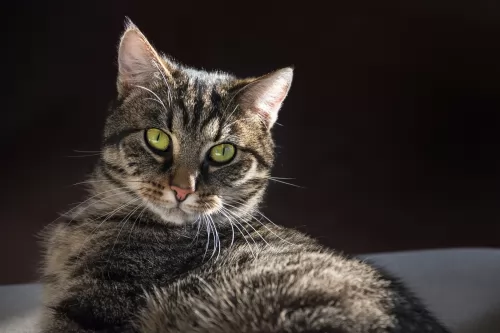 The European Shorthair is a cat breed that hails from Sweden but it also has roots that go back to the Roman Empire.
The European Shorthair is a cat breed that hails from Sweden but it also has roots that go back to the Roman Empire.
It is referred to as a natural cat breed, which means that the cat came about naturally without any human intervention.
The cat has had great hunting skills and this has what has made it sought after as a cat to keep rodents at bay. It became a famous housecat as well.
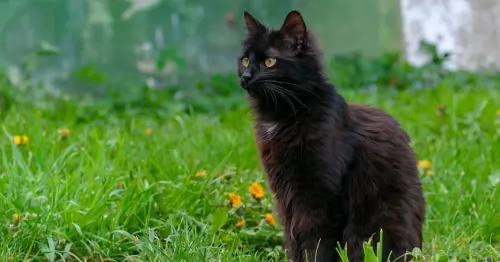 The York Chocolate cat is often referred to simply as the York. The cat was developed in New York in 1983 by breeder Janet Chiefari. The American breed of cat came about by selecting certain colors for breeding.
The York Chocolate cat is often referred to simply as the York. The cat was developed in New York in 1983 by breeder Janet Chiefari. The American breed of cat came about by selecting certain colors for breeding.
The breed isn’t recognized by cat registries, however, in March 1990, the Cat Fanciers’ Federation of the New England area recognized York Chocolates as an experimental cat breed.
By 2016 no registry carried its breed standard and it looks as though the cat is now extinct. Later is was also established that the International York Chocolate Federation was founded in 2003 but that the site seems to be archived.
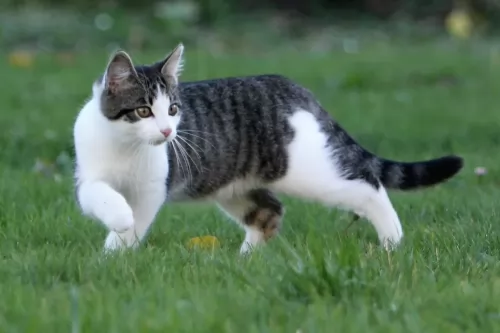 These domestic cats of Europe are a medium- to large-sized cat, weighing between 4 and 6kg, though some can be heavier.
These domestic cats of Europe are a medium- to large-sized cat, weighing between 4 and 6kg, though some can be heavier.
The European Shorthair has a fairly large head and medium-sized ears. The body is robust and round shaped. The cat’s short coat without an undercoat comes in a range of colors and patterns such as white, cream, red, black and blue with eyes that are green, yellow, brown or copper or blue.
The European Shorthair is known for its adaptable nature and the cat is able to fit into different lifestyles with ease. It's a cat that will live happily with children, pets, adults and seniors.
The cat loves his human family and loves becoming involved with fun games and activities. It's an intelligent cat too and cat food puzzles help him to think about how to get his food.
Even though your cat is social with his human family, it becomes fairly shy and nervous of strangers.
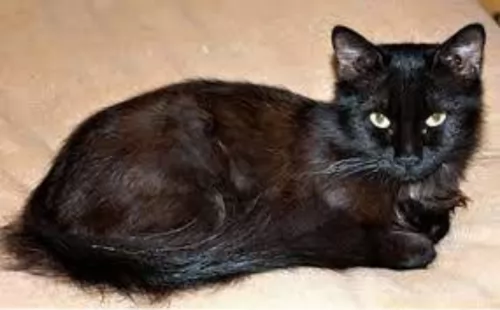 Today the breed is still under development and in the experimental stages. It is a medium to large cat, both robust, sturdy, and muscular.
Today the breed is still under development and in the experimental stages. It is a medium to large cat, both robust, sturdy, and muscular.
He can weigh up to 7 or 8 kg. The head is medium-sized with a rounded muzzle and the ears fairly large, pointed and tufted and broad at the base.
The eyes are medium in size, almond-shaped, and slanted slightly. The color of the eyes is a striking gold, green, or hazel.
The legs are also medium to long in length and well-muscled with the hind legs being a bit longer than the forelegs. The coat is medium to long, smooth and glossy with no undercoat. Color of the coat is mainly a rich chocolate color or silver, black and white.
The York Chocolate is a loyal and friendly cat. He is independent and although he loves his human family, he is perfectly happy on his own as well. They make wonderful pets as they get on well with children and also with other pets in the home.
They’re even-tempered and adapt well to all kinds of lifestyles. What is notable about this cat is that even if you tend to ignore him, he wants to lavish you with his attention. He is a cat that just loves to spend time with his human family.
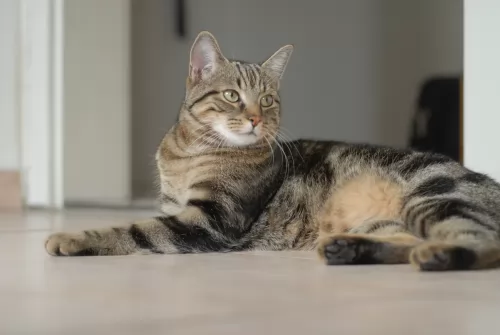 The European Shorthair is such a sweet cat and he is able to adapt fairly easily to new environments. It is such an ideal cat for households with singles, couples, families, and seniors as it adapts its personality to suit, getting on well with other pets as well.
The European Shorthair is such a sweet cat and he is able to adapt fairly easily to new environments. It is such an ideal cat for households with singles, couples, families, and seniors as it adapts its personality to suit, getting on well with other pets as well.
The cat loves his human family and wants to please, but loves to play too, being active and playful. Having one of these cats in your home is like bringing in a treasured gem.
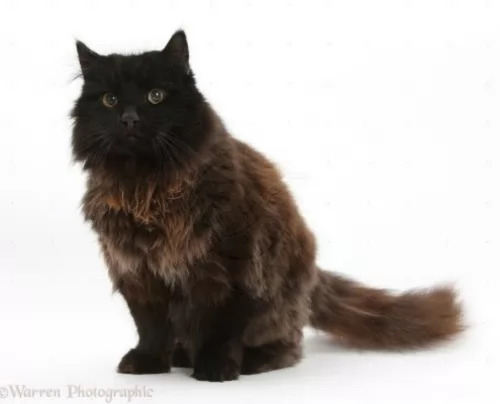 The York Chocolate is an ideal breed for families but he will get along well with single people too who are willing to make a fuss of him.
The York Chocolate is an ideal breed for families but he will get along well with single people too who are willing to make a fuss of him.
He is the kind of cat that makes himself at home indoors or outdoors. He has such an amicable nature and wants to be your friend. In return for this friendship, he needs to be given a whole lot of love and attention.
 Even if your European Shorthair appears to be well, it is a good idea to get used to taking your cat to the vet for an annual check-up.
Even if your European Shorthair appears to be well, it is a good idea to get used to taking your cat to the vet for an annual check-up.
To provide your cat with the best chance to remain healthy, good diet and exercise is imperative. Look out for an itchy skin too as this could well be a sign that your cat is being plagued by parasites. Parasites can be a terrible problem and it will need to be attended to by your vet.
Parasites and an itchy skin can be a nightmare for your pet and make him most miserable with excessive scratching and licking as well as thinning of hair.
A new kitten will also require being vaccinated to ensure he remains healthy. These injections protect your cat from life-threatening diseases. Usually, vets start vaccines at between 8 – 12 weeks of age to protect your cat against the likes of Feline Leukaemia Virus, Feline Infectious Enteritis and Cat Flu.
There are also other vaccinations you might want to consider such as rabies and chlamydia.
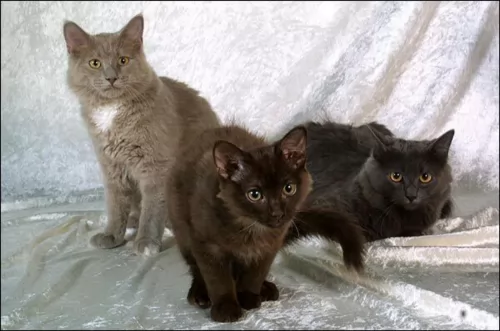 York Chocolates are generally considered to be healthy cats, but always schedule regular wellness visits with the vet if you suspect even the smallest illness.
York Chocolates are generally considered to be healthy cats, but always schedule regular wellness visits with the vet if you suspect even the smallest illness.
The insides of the cat’s ears should be examined regularly for signs of dirt and wax build-up that can lead to an infection.
The trend these days is to brush your cat’s teeth. This can absolutely traumatize your cat. When you take your cat for a check-up he will in any case look inside your cat’s mouth to make sure there aren't any bad teeth.
As a cat owner, it is a good idea to recognize the signs and symptoms of common illnesses in your cat. Cancer
Cats can get different kinds of cancer – where cells grow uncontrollably and spread to all parts of the body.
When a cat doesn't produce insulin, his blood sugar levels elevate and this can result in hyperglycemia.
Rabies is a viral disease that affects the brain and spinal cord. It's a deadly disease that can be prevented by vaccination.
Vomiting is a common problem with cats with many different causes. The danger with vomiting is that it can lead to dehydration,
A cat’s upper respiratory tract is susceptible to infections caused by a variety of viruses and bacteria.
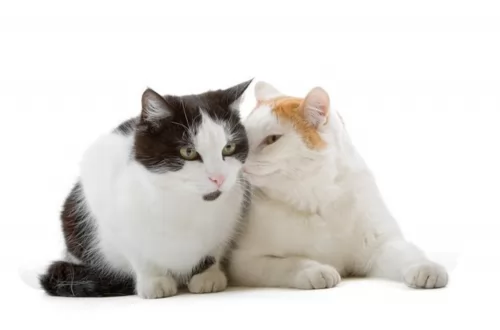 European Shorthairs like to groom themselves, but even so, you want to brush your cat once a week to keep the hair shiny and healthy. Make sure to trim your cat’s claws at the same time. It’s your time to feel for any unusual lumps or scratches on your feline friend’s skin. Check his eyes and make sure they are still bright and clear, look inside the ears to make sure they aren’t becoming clogged with dirt and wax and look inside the mouth to ensure no signs of gum- and tooth disease.
European Shorthairs like to groom themselves, but even so, you want to brush your cat once a week to keep the hair shiny and healthy. Make sure to trim your cat’s claws at the same time. It’s your time to feel for any unusual lumps or scratches on your feline friend’s skin. Check his eyes and make sure they are still bright and clear, look inside the ears to make sure they aren’t becoming clogged with dirt and wax and look inside the mouth to ensure no signs of gum- and tooth disease.
Your cat may well be outgoing with his human family, but his nervousness with strangers will require you providing him with a safe haven of his own. This might be his own bed which should be in a safe, dry, quiet area where he can retreat and feel more secure.
European Shorthairs love being outdoors and particularly if you have a female you’ll want her spayed to avoid her becoming pregnant. Cat shelters are already full of unwanted kittens and you don’t want to add to the burden. Also, have your male neutered too as he is ar less likely to want to roam. Spaying and neutering come with many health benefits too.
Be very careful of your cat’s diet. This is because the domestic cat is a carnivore and still essentially a predator, liking to hunt for their meat. They require a meat diet. However, cats have special dietary requirements and they require a balanced diet. All cats are individuals and they have different food likes and preferences, but they all need the best food there is to remain in peak condition. If you feed your cat commercially manufactured food, always follow the instructions on the label.
Provide your feline pet with cat accessories – food and water bowl, collar and tag, soft bedding, a climbing tree, scratching post, litter box, grooming accessories and toys.
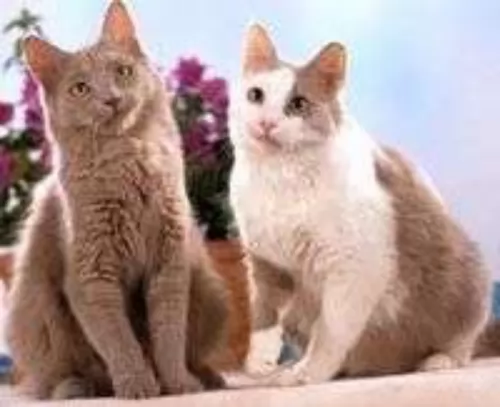 The coat of the York Chocolate is fairly short and it doesn't shed heavily. A weekly brush will suffice to help remove dirt and loose hairs as well as to maintain the coat’s sheen.
The coat of the York Chocolate is fairly short and it doesn't shed heavily. A weekly brush will suffice to help remove dirt and loose hairs as well as to maintain the coat’s sheen.
A high-quality diet high in protein and animal meat must be provided for your cat Cats are carnivores and are not plant eaters.